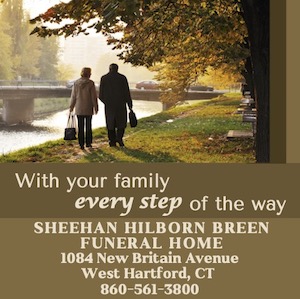By Cindy Mindell ~
GREENWICH – For 40 years, U.S. law has made it possible for Jews to escape persecution in Eastern Europe and build new lives in this country. The Jewish communities of Connecticut have been instrumental in helping these refugees with resettlement and acculturation. Now the Jackson-Vanik Amendment and the Lautenberg/Specter Amendment are set to expire.
Over the next six months, the Ledger will visit each of the Connecticut communities that has made a difference for Jewish emigres. We begin with Greenwich.
There is a good reason why the Russian Resettlement and Acculturation program at Jewish Family Services (JFS) of Greenwich is named after Susan B. Davis. The longtime Greenwich resident practically started the effort single-handedly.
It was in 1984 that Davis decided that her small Jewish community could be doing more to help global Jewry. That was the year that she and a small group of fellow UJA Federation donors met in secret to help raise money for Operation Moses, the first Israeli rescue mission of Ethiopian Jews.
“I said, ‘If we’re helping Ethiopian Jews, why aren’t we helping the Russian Jews?’” she recalls. Other communities were already involved in the resettlement of Soviet Jews, such as the adjacent community of Stamford which would help more than 300 families before it closed its program in 1997.
“Some of us had been giving money to Federation and noticed that we never received any Russian families,” Davis says. “We started asking why.”
One reason was that none of the émigré applicants had family in Greenwich to act as sponsors. Davis and Nancy Zisson, then-president of UJA Federation and one of its founders, requested applications from the Hebrew Immigrant Aid Society (HIAS) in New York, the organization coordinating resettlement efforts. The two women and a small group of fellow volunteers “adopted” three families who had no relatives in the U.S. and brought them to Greenwich.
Davis and Zisson had no formal experience in helping refugees. But by the time the resettlement and acculturation program was closed two years ago for lack of demand, Davis and the Jewish community of Greenwich had helped 100 people start new lives.
Born in Bridgeport to Holocaust survivors, Davis knew the refugee experience firsthand. The Nazis had wiped out 100 members of her mother’s family in Romania and Czechoslovakia. “My mother and the Red Cross looked for relatives and couldn’t find anyone,” she recalls. “She was in shock that, from such a large family, no one came back.”

Left to right: Inna Dybova, Natalia Dybova, David Dybova, and Mark Furman were reunited in the U.S. after 12 years, thanks to efforts by Jewish Family Services of Greenwich
As a child, Davis remembers groups of young men “with numbers on their arms” at the family dinner table on a weekly basis and at her father’s Pinochle table after the meal.
After the Hungarian Revolution in 1956, the family sponsored 11 relatives who immigrated to the U.S. as refugees. Davis remembers driving with her parents to pick them up at Camp Kilmer in New Jersey and helping them resettle in the Jewish community of Bridgeport. There, the bi-lingual Davis acted as the family’s translator and tutor.
That was the experience Davis drew from when the Russians came to Greenwich. Each family arrived with next to nothing — $50 and a suitcase. Davis engaged the Jewish community to donate money, clothing, used cars, and household items, and provide apartments for free or at a discounted rent, covered by interest-free loans from Jewish Family Services of Greenwich. Davis arranged tuition-free nursery-school and Hebrew-school slots at Temple Sholom and secured High Holiday tickets for families. Doctors and dentists in the community provided free care, and Davis and her fellow volunteers helped find job-training and employment resources for the adults. She involved social workers and nutritionists in the acculturation process. Families hosted the refugees for the High Holidays and Passover, and most of the children became b’nai-mitzvah.
“Everybody pitched in,” she says, including the refugees themselves. “When they started working and really got on their feet, they would make monthly payments to return the JFS loan and we used the money for the next Russian family we resettled. People would say, ‘I bet they will never pay you back,’ but every loan except for one was paid off.”
Davis started a thrift store in Byram that employed some of the Russian refugees and whose proceeds were put back into the resettlement effort. She helped families find affordable homes and established scholarship funds at JFS to send Jewish youth in Greenwich to attend Jewish summer camp and college. JFS allocated monies to help send young adults from the resettled families on Birthright Israel trips. A member of the Jewish community created a $50,000 endowment fund for Jewish refugees. Around 10 years ago, the resettlement and acculturation program was named for Susan Davis, a daughter of refugees.
“We tried to make Jews out of these families because they weren’t able to practice their religion in Russia,” says Davis, who has followed the refugees through their citizenship process and beyond, even after HIAS closed the program due to a lack of applications from Russian Jews. She is still in contact with several of the families who remained in the area, helped relocated grandparents to senior housing, knows about their grandchildren’s marriages and babies – most celebrated with a bris or a baby-naming because of the Jewish education the community was able to offer.
HIAS and its Jewish Family Service affiliates have closed the Russian-Jewish resettlement programs in Connecticut over the last few years, although the JFS agencies continue to serve that population with college grants, emergency loans, and counseling. They also still help resettle the occasional Jewish family from what is now referred to as the Former Soviet Union (FSU).
In 1999, Inna Dybova and her husband, Mark Furman, emigrated from Russia and were resettled by JFS of Greenwich. They left behind their daughter, Natalia, and 8-year-old grandson, Prokhor. It took 12 years of political navigation and endless appeals, and in October, Natalia, Prokhor, and his younger brother David were finally granted refugee status and allowed to rejoin Inna and Mark.
Susan Davis carries the echo of her own family’s refugee experience, and has always worked to improve the lot of those who came after. “When I told my mother what our community was doing to help these families, she told me that there was nothing and nobody waiting for them when they arrived before World War II,” Davis recalls. “They all had to help each other. No one could get here without a sponsor, and it was Sen. Thomas Dodd who helped my family. When I had the opportunity, I was only too happy to return the favor to Russan-Jewish families fleeing persecution and seeking new lives.”








 Southern New England Jewish Ledger
Southern New England Jewish Ledger








